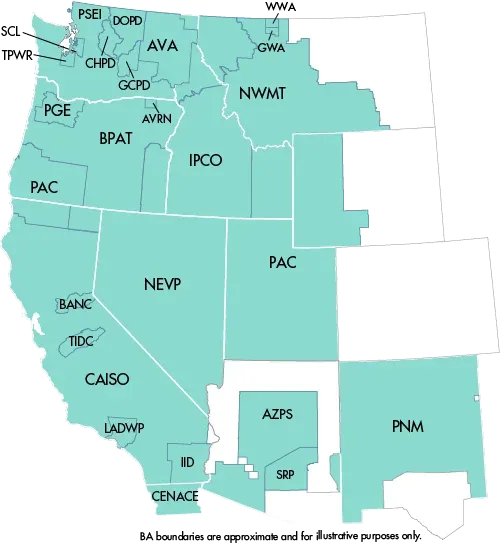Spring is the season of managing planned maintenance for RC West

Spring is just around the corner, bringing fresh blooms and a busy season for RC West. As the reliability coordinator for 42 balancing authorities and transmission operators in the Western United States, spring means it’s time for planned maintenance of the energy resources and electric grid components.
From March through May each year we focus on coordinating and scheduling maintenance-related transmission and generation outages so we can maintain electric reliability even while a significant number of resources are temporarily unavailable. These activities are completed in the Spring because energy demand is traditionally low and performing maintenance now will ensure we’re ready for the Summer and peak demand.
As highlighted in a blog last year, RC West holds the highest authority in coordinating planned maintenance of facilities connected to the grid, among other important responsibilities. Effective coordination and transparency are key to our success. This means ensuring planned maintenance outages are communicated well in advance and understanding their impact on operations. It’s a massive undertaking, with careful management of thousands of planned outages.
The maintenance work can involve everything from calibrating equipment, minor clean-up, changing out aging equipment, repairing or replacing utility poles, to installing new transmission facilities that have been identified as necessary through the transmission planning process.
RC West processes maintenance requests on a first-come, first-served basis, so it’s important that transmission and generation owners notify us early when planning to take an asset offline for maintenance. This early notification allows us to effectively manage potential conflicts and find ways to work around them if they arise. The North American Electric Reliability Cooperation (NERC) requires RCs to have an agreed upon conflict resolution process.

For RC West, we worked with our customers to develop an approach that is well documented in our published RC0630 Outage Coordination Process Procedure, which also explains that there are sometimes extenuating circumstances that may warrant giving priority to a later outage submission. A few examples include environmental, regulatory or legal constraints. As always, safety requirements override everything and real-time system conditions will always take priority.
If a transmission operator wants to take a line out of action so maintenance work can be performed, it first needs to share that information through an outage maintenance request with RC West and get our approval. Our team works with the transmission operators to develop operating plans and ensure timely coordination and resolution of conflicts for transmission and generation outages within the RC West area.
If a transmission outage has an impact on the transfer capability of a major transmission path within the Western Electricity Coordinating Council (WECC), the transmission operator is also expected to coordinate with neighboring and affected parties to ensure the outage is acceptable and maintains reliability. Coordination and planning are key because ours is one of the few industries where the product (power) is being produced and consumed at the same time and therefore requires a delicate balancing act to maintain system operations while taking important assets offline for maintenance.
To help us manage the various pieces of this puzzle, we have five different study windows where our engineers can assess the impact of a particular maintenance request: long-range, mid-range, short-range, day-ahead, and real time.
If we determine that taking a facility offline can cause reliability issues that cannot be resolved during a particular timeframe, RC West will deny the planned maintenance request until it can be rescheduled for a more opportune period.
With the high integration of renewables in the Western Interconnection and their variability depending on the time of day and weather, RC West is one of the few reliability entities that performs hourly studies about whether there is enough capacity to meet demand for each study window. This adds more complexity to the studies, but it enhances reliability, which is our top priority.
Just like spring cleaning at your home, this is the time to make sure our electric system is ready to shine for the summer. It is through the hard work and coordination of our team and all of our customers, that we ensure the grid remains reliable throughout this important and busy time of the year.


